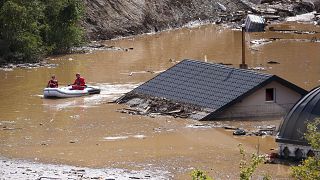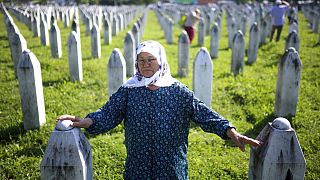Bosnia and Herzegovina
Along a section of the Drina river that forms a natural border between Bosnia and Serbia, simple gravestones mark the final resting places of dozens of migrants who drowned in recent years trying to reach Western Europe.
Locals in the Bosnian town of Bijeljina created the space to “preserve the dignity” of these nameless victims and mark their passing.
“It started in 2016 with sporadic incidents involving migrants, occasional cases when we would pull out an unidentified body from the river, but this began to increase in 2018,” said Nenad Jovanovic, head of the town’s search and rescue services.
He said they have probably pulled the decomposing bodies of between 40 and 50 migrants from the Bosnian side of the river since then.
“The bodies are sometimes in such an advanced phase of decomposition that it is very hard to determine their approximate age, that it can be done only through pathological examination,” Jovanic added.
After examination by a forensic pathologist, the unidentified remains were previously buried with simple wooden markers, but these have now been replaced by more durable stone gravestones.
Under local laws, bone samples are taken from unidentified bodies before burial and must be kept for six months in case someone comes looking for a missing relative and needs a DNA sample for comparison.
But pathologist, Dr Vidak Simic has been keeping the samples for long past the time limit set by the law.
“All these people are recorded as unidentified, but they all once had a name and a surname, they had fathers, mothers, brothers, and sisters. That is why I do it, ” he said.
He has advocated for the creation of an online DNA database for the migrants which could be consulted by relatives in faraway countries.
Simic also notes any identifying scars or marks on the bodies he examines and keeps cuttings from their clothes, and is happy to help everyone who comes looking for a missing migrant or a refugee.
“I am not supposed to share some of the information I have, but I do it anyway out of conviction that each body, each soul, must find its way home, to its homeland, hometown, home village,” he said.
Mario Tomic heads a municipal company in Bijeljina that is charged with running and maintaining the city’s public cemeteries, where the rotting wooden markers were removed and replaced with black marble gravestones.
“Since we now have, unfortunately, a significant number of unidentified migrants buried here, we believed that it was important to give them dignified resting places because they are no different to us. All humans are the same, all made up of flesh and blood,” he said.
Migrants typically enter the country from the south-east, crossing the rivers that separate it from Serbia and Montenegro, before heading towards Bosnia’s north-western pocket bordering European Union member state Croatia.













Go to video
Nearly 200 migrants intercepted off the coast of Senegal
01:25
Greece blocks asylum claims after surge in migrant arrivals
01:05
Migrant centre in landmark New York hotel closes down
01:36
From track to diplomacy: Usain Bolt named EXPO 2027 ambassador
01:06
Congo, Chad, Eritrea, Sudan and Somalia hit by U.S. travel ban
01:53
Italian Constitutional Court holds hearing on detention of rescue ship in 2024